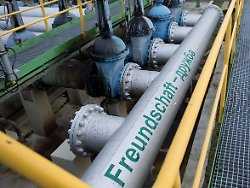More than oil and gas suppliers
Kremlin companies at switching points of the energy supply
By Max Borowski
4/6/2022, 5:19 p.m
The Gazprom Germania case is alarming: Germany is not only dependent on Russian energy supplies. Important control centers of the gas and oil industry within Germany are also under Russian control. This is already having a noticeable impact.
The economics minister pulls the emergency brake and places Gazprom Germania GmbH under receivership by the Federal Network Agency. The step is “absolutely necessary” to protect public safety and order and to “maintain security of supply,” explained Robert Habeck.
The measure, which is unprecedented in Germany, shows that Russia’s role in Germany’s energy supply is even greater than the high dependency on Russian oil, gas and diesel supplies alone suggests. The Russian companies not only supply the energy sources, they have also taken key positions in their distribution, processing and sales in Germany in recent years. An overview:
Gazprom Germania
The Gazprom group is a prime example of what technical jargon calls vertical integration. With its subsidiaries and holdings, it is involved in all stages of gas supply, from production to export, pipeline transport and trading within Germany to marketing to end customers: Gazprom has the monopoly for gas exports in Russia. When the company’s gas arrives in Germany – mainly through the Nord Stream 1 pipeline, which is majority-owned by Gazprom – it is fed into the German distribution network. One of the most important operators of these inner-German pipelines is the company Gascade, in which Gazprom Germania holds 50.3 percent of the shares. Other important pipelines in Germany – the North European natural gas pipeline NEL and the Baltic Sea pipeline connection line Opal – belong to the company WIGA, in which Gazprom Germania has a 49.98 percent stake. The majority belongs to the German oil company Wintershall Dea, which in turn owns a third of the investment company Letter One, which is backed by the oligarch Mikhail Fridman, who has since been sanctioned by the EU.
The 100 percent Gazprom Germania subsidiary Wingas plays a leading role in the sale of gas to major customers such as municipal utilities, regional gas suppliers, industrial companies and power plants in Germany. It has a market share of around 20 percent. Both Gazprom and Wintershall Dea also have shares in the Berlin gas trading company that is active in this business.
natural gas storage facility
Gazprom Germania plays a central role in the operation of natural gas storage facilities in Germany through its subsidiary Astora. These are essential for survival as a buffer, especially in winter, should gas imports falter for technical or political reasons. Among other things, Astora operates the largest German storage facility in Rehden in Lower Saxony as well as others in Jemgum near the Dutch border and one in Austria. Astora thus manages around 20 percent of the total natural gas storage capacity in Germany.
However, all of these reservoirs were hardly filled last summer and thus made a significant contribution to the dramatic price increases for wholesale natural gas in Europe that began in the second half of the year. The important storage facility in Rehden is currently almost completely empty, which is one of the reasons why an immediate ban on imports of Russian gas would have a particularly dramatic impact on Germany. Gazprom also has a stake in another storage facility in Etzel, also on the North Sea coast of Lower Saxony.
Rosneft
In addition to Gazprom, another Russian state-owned company is of central importance for the German energy industry: the oil giant Rosneft is not only an important supplier, but also its own customer. The most important subsidiary of Rosneft in Germany is the PCK refinery in Schwedt. Rosneft currently holds a majority stake of 54 percent. Last year, the Kremlin company bought its previous partner Shell’s 37.5 percent stake in order to take full control of the refinery. The federal government had approved the deal shortly before the Russian attack and is now examining whether and how it can reverse it.
On the one hand, the Schwedter refinery is completely dependent on Russian oil supplies due to a direct connection to the Druzhba pipeline to Russia. So far, there are no other transport routes to supply them with sufficient crude oil. On the other hand, large parts of north-eastern Germany, including the capital Berlin, depend on the refinery for their fuel supply. The “Handelsblatt” writes of a market share of 95 percent in Berlin and Brandenburg. The capital’s airport BER is directly connected to the refinery. “Without the PCK refinery, no plane would take off from BER and there would no longer be a fire service vehicle in the entire region,” the business newspaper quoted an industry insider as saying.
Like Gazprom in the gas business, Rosneft is also one of the most important traders and logisticians for its own product. According to “Handelsblatt”, the group companies supply 4,000 major customers in Germany.
Wintershall Dea
While the Economics Ministry has been working on contingency plans for weeks to take over the Gazprom and Rosneft subsidiaries in an emergency so that they cannot paralyze Germany’s energy supply, the situation at Wintershall Dea is less dangerous. The group produces oil and gas in many countries, including Germany, Norway and Russia. As already mentioned, he holds shares in the areas of transport and logistics. The group was formed just two years ago from the merger of the BASF subsidiary Wintershall and the former RWE subsidiary Dea, which was previously owned by the Russian oligarch Fridman.
The Kremlin-affiliated billionaire currently has little influence. The investment company Letter One, founded by Fridman, only holds a minority of 33 percent of the voting common shares in the merged company. In addition, Fridman is on the EU sanctions list, among other things, and is therefore excluded from the management of Letter One.
